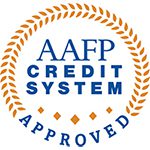2025 Practice Enhancement Through Clinically Correct Coding
AMBULATORY Core Track
Ambulatory Core Track:
This is perfect for onboarding a new hire to help transition them into the “real world”. Additionally, this can serve as a yearly overview of the key components for success in primary care.
All sessions are updated to current guidelines and can be set up as a “training module” complete with pre-test assessments, 8 modules of education, and a post-test to assess mastery – plus access to Dr. Ulmer to help clear up areas still not understood after completion.
CME: 4 hours of AMA PRA Cat I/AAFP Prescribed credit allowed upon completion. Suitable for all providers (MD/DO, NP, PA)
- Know how to apply time-based coding in the ambulatory office setting
- Define the clinical application of the Medical Decision-Making (MDM) components
- Understand how to use prolonged services
- State the importance of care coordination and understand how to transition patients from hospital to home, from home to office, and then office to home
- Differentiate between the two Transitional Care Management codes and know when to bill each (tie to ED f/u and HF f/u)
- Know processes needed to compliantly implement and bill for this in your practice
- Define the three types of Medicare Wellness Visits
- Know how to correctly perform, document, and bill for each of these services
- Understand how to correctly apply chronic disease care delivery in the context of the Medicare Wellness Visit with the addition of the -25 modifier
- Define how to find the central source of updated information on Medicare Preventive Services, codes, co-insurance, and coverage intervals
- Describe the covered services offered through Medicare in breast, colon, and lung cancer screening
- Discuss the preventive services offered through Medicare related to intensive behavioral therapy
- State why physicians should engage their patients in end-of-life care discussions
- Know the specific documents used for end-of-life decision making
- Be able to perform, document, and correctly bill for ACP services
- Be able to define optimal clinical “documentation”, “redocumentation”, and “risk” scores
- Explain the 2024 HCC transition from Version 24 to Version 28
- State the financial possibilities associated with optimal performance in this area
- Understand the details associated with HCC code capture with cardiovascular conditions
- Understand the details associated with HCC code capture with hematology/oncology conditions
- Understand the details associated with HCC code capture with metabolic and endocrine conditions
- Define “Population Health Management”
- Understand key data points needed to succeed in population health management
- Restate strategies needed to keep aligned with this aspect of medicine
There are 8 Sessions in this track.
Until December 31st, 2025.
Available for download upon successful completion of each session.
The AAFP has reviewed Practice Enhancement Through Clinically Correct Coding and deemed it acceptable for Prescribed credit. Term of Approval is from 01/01/2025 to 12/31/2025. Physicians should claim only the credit commensurate with the extent of their participation in the activity.

Each Session has been assigned 0.5 CEU credits, for a total of 4 CEUs.
Note: You will receive a downloadable Certificate of Completion upon finishing each session